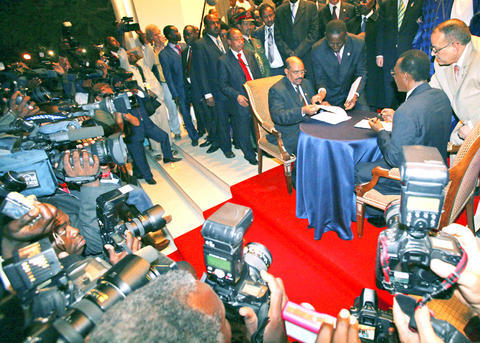The heads of Sudan and Chad on Thursday signed a non-aggression pact -- the sixth deal in five years aiming to halt hostilities between the African rivals.
Sudanese President Omar al-Beshir and Chadian President Idriss Deby signed the accord and shook hands at the Senegalese presidential palace in the presence of UN Secretary-General Ban Ki-moon and Senegalese President Abdoulaye Wade.
It came after more than 24 dramatic hours of attempts by Wade to bring the two arch-rivals together in Dakar.

PHOTO: AP
Beshir and Deby accuse each other of backing rebels seeking to overthrow their governments and there have been several clashes between their armies.
The text of the deal, released by Senegalese Foreign Minister Cheikh Tidiane, said "we solemnly engage to prohibit all activity by armed groups and to stop the use of our respective territories for the destabilization of one or other of our states."
The two presidents also committed to a personal reconciliation and to normalize relations between their countries.
They promised to help establish peace and stability in the troubled region already stricken by the Darfur conflict in western Sudan, on Chad's border. They also vowed to implement their past accords -- though widespread doubts have been expressed about the viability of any of the deals.
Beshir failed to turn up for one mini-summit after his arrival in Dakar on Wednesday night. Wade said Beshir blamed his absence on a headache.
On Thursday, Deby's government said Chadian rebels based in Sudan had crossed the border to launch an offensive.
Chadian rebels and Sudan denied the claim which highlighted the rivalry between the pair.
General Mahamat Nouri, who now heads Chad's main rebel force, said "nothing is going on" and in Dakar, Sudanese Deputy Foreign Minister al-Sammani al-Sheikh al-Wassila told reporters: "I can assure you this is complete nonsense."
Chad appeared to be calm, said a spokesman for EUFOR Chad-CAR, the force of 3,700 French-led soldiers starting to deploy in Chad and the neighboring Central African Republic with a mandate to protect Darfur refugees.
The UN said on Wednesday that there are now about 470,000 refugees in eastern Chad -- 250,000 from Darfur, 57,000 from the Central African Republic and 180,000 internally displaced Chadians.
Three rebel factions drove across southern Chad in late January to launch a bloody assault on Ndjamena on Feb. 2 to Feb. 3, which left scores dead. It was pushed back by Deby's forces with French logistical help.
Deby accused Sudan of arming the rebels and letting them use bases in Sudan. The Khartoum government denied the claims.
Libyan leader Muammar Qaddafi brokered one peace deal in February 2006 and another was sealed in the Sudanese capital in August the same year.
Sudan, Chad and the Central African Republic made another agreement last year not to let rebels from other countries use their territory.
In May last year Deby and Beshir made another pact after praying together at the Kaaba, Islam's holiest shrine at Mecca in Saudi Arabia.
Beshir made a new swipe at his rival on Tuesday.
"After the prayers inside the Kaaba, hand in hand, we said: `We have a deal and may Allah punish he who breaks it,'" Beshir said in Dubai. "If the Chadian president failed to honor an agreement made inside the Kaaba, how can you expect him to adhere to an agreement he [might] sign in Dakar?"

Shamans in Peru on Monday gathered for an annual New Year’s ritual where they made predictions for the year to come, including illness for US President Donald Trump and the downfall of Venezuelan President Nicolas Maduro. “The United States should prepare itself because Donald Trump will fall seriously ill,” Juan de Dios Garcia proclaimed as he gathered with other shamans on a beach in southern Lima, dressed in traditional Andean ponchos and headdresses, and sprinkling flowers on the sand. The shamans carried large posters of world leaders, over which they crossed swords and burned incense, some of which they stomped on. In this

The death of a former head of China’s one-child policy has been met not by tributes, but by castigation of the abandoned policy on social media this week. State media praised Peng Peiyun (彭珮雲), former head of China’s National Family Planning Commission from 1988 to 1998, as “an outstanding leader” in her work related to women and children. The reaction on Chinese social media to Peng’s death in Beijing on Sunday, just shy of her 96th birthday, was less positive. “Those children who were lost, naked, are waiting for you over there” in the afterlife, one person posted on China’s Sina Weibo platform. China’s

‘NO COUNTRY BUMPKIN’: The judge rejected arguments that former prime minister Najib Razak was an unwitting victim, saying Najib took steps to protect his position Imprisoned former Malaysian prime minister Najib Razak was yesterday convicted, following a corruption trial tied to multibillion-dollar looting of the 1Malaysia Development Berhad (1MDB) state investment fund. The nation’s high court found Najib, 72, guilty on four counts of abuse of power and 21 charges of money laundering related to more than US$700 million channeled into his personal bank accounts from the 1MDB fund. Najib denied any wrongdoing, and maintained the funds were a political donation from Saudi Arabia and that he had been misled by rogue financiers led by businessman Low Taek Jho. Low, thought to be the scandal’s mastermind, remains

Australian Prime Minister Anthony Albanese yesterday announced plans for a national bravery award to recognize civilians and first responders who confronted “the worst of evil” during an anti-Semitic terror attack that left 15 dead and has cast a heavy shadow over the nation’s holiday season. Albanese said he plans to establish a special honors system for those who placed themselves in harm’s way to help during the attack on a beachside Hanukkah celebration, like Ahmed al-Ahmed, a Syrian-Australian Muslim who disarmed one of the assailants before being wounded himself. Sajid Akram, who was killed by police during the Dec. 14 attack, and